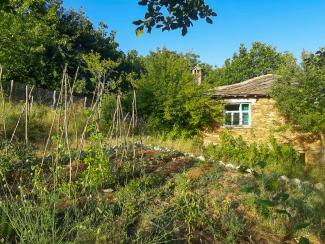
Tsarino
After its gradual depopulation in the late 1970s, Tsarino disappeared from the map. In recent years, this small village in the Eastern Rhodopes has been undergoing a gradual revival and has become a home for contemporary art in a rural setting amidst nature.
Run by artists and volunteers, the Tsarino Foundation has been organising residencies, exhibitions and other cultural events in and around the village for over a decade. The foundation strives to serve as a platform for exchange between the local community, the regional art scene, and contributors from the international contemporary art world, while restoring and maintaining Tsarino as a village by renovating buildings and infrastructure. The foundation places great importance on staying true to the original character and tradition when it carries out any restoration work and is also sensitive to this when designing and building new structures.
A stay in Tsarino offers a unique opportunity for artists, writers, and researchers seeking a self-directed residency amidst nature in an abandoned village setting. Secluded in its own valley affected by distinct seasons, the village undergoes noticeable transformations throughout the year. Staying here provides an authentic experience of the local rural culture and opportunities to interact with the community.
Currently, the Tsarino Foundation invites applications for their self-directed residency programme, open to individuals, duos, or small groups!
The Razklon Gallery: Situated at the crossroads connecting three villages, the Razklon Gallery is a small outpost for contemporary art in the midst of nature. Built and curated by the foundation, the gallery is available to artists interested in presenting their projects in a remote and natural setting, with curious cows as their main audience.
Self-directed residencies may be entirely research-focused, without the requirement of a conclusive outcome. However, if the artist wishes to share their work publicly, opportunities include spaces like the Razklon Gallery, the “Chitalishte” (the cultural centre) in Chorbadzhiysko, or in Tsarino itself.
Each artist will have a private studio furnished with a working table and chair. In addition, there is extra working space available to meet individual needs — participants are invited to make use of foundation-owned abandoned structures in the village of Tsarino and the surrounding fields and forests.
Each house is equipped with a basic set of hand tools. Battery-powered tools and gardening equipment are available on request.
There is a solar-powered charging station that can charge phones, laptops and other small devices, and power tools and appliances up to 500 watts. Please note that electricity is generally limited and depends on weather conditions, particularly during the winter season. However, there is one generator available for more energy-intense applications, and devices can also be charged in Chorbadzhiysko.
All participants stay in traditional hand-built houses. Each guest has a private bedroom in a house shared by a maximum of two people, furnished with beds, tables, chairs, carpets, and a wood-burning heater in each room. Most houses have one or two bedrooms, a kitchen and one or two studios. Outside, there are composting toilets and wood-fired showers. During the summer, a solar-powered heating system provides hot water. Drinking water is available on tap, directly from a spring close to the village. Clean sheets, towels, and blankets are provided for the colder periods.
The communal, roofed outdoor kitchen, situated near the houses, is available for everyone to use for cooking, working, or relaxing. Cooking is generally done on a wood-fired stove or over an open fire. Each house is also equipped with a gas burner to make a quick coffee or tea. Meals can be enjoyed in the shade on the adjacent terrace or under the roof by the fire when it is raining or cold.
Please note that as the programme and its facilities continue to develop gradually, the amenities provided will be basic but functional.
Groceries can be purchased in Chorbadzhiysko, which the organisers usually visit for the Wednesday market. For convenience, they recommend doing your weekly shopping together with them during these trips. Depending on the time of year, the market offers a variety of fruits and vegetables, clothing, tools, household items and knickknacks.
During your stay, the foundation will be available to assist you with technical support, organising materials, and Bulgarian communication. The foundation can provide around eight hours of support per week. Additionally, they are always on hand to answer your questions or provide advice.
The formerly abandoned village of Tsarino is a small village in the Bulgarian Rhodope Mountains, near to the Greek border. It was abandoned over thirty years ago by all original inhabitants except one. This was due to a combination of factors, one of which is its isolated setting amongst hills and forests. Over time, most original inhabitants moved to Chorbadzhiysko, a nearby town revolving around agriculture, growing predominately peppers and tobacco. Tsarino (its previous name in Turkish was Hasyurt) belongs to a Pomak community of Muslim Bulgarians. Pomaks are a minority group living side by side with the ethnic Turkish community, making up over half of the population in this region.
Although abandoned, Tsarino is still of significance to the communities of the area. Its mosque and graveyard are still maintained and used. Some families visit their houses, pick fruits or ‘park’ their cows in the village. The animals can take care of themselves and use the empty houses as their homes. In recent years, the local community has shown a growing interest in Tsarino. Previous inhabitants of Tsarino have taken initiatives to restore their houses or a stretch of road.






